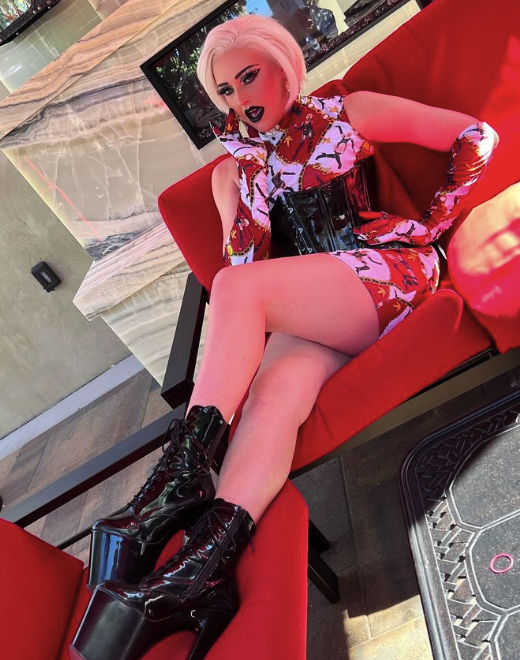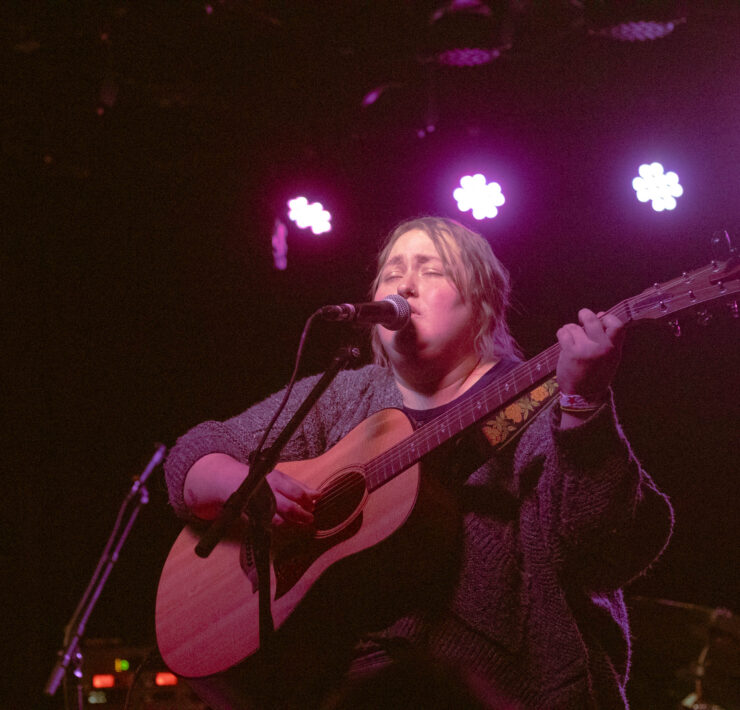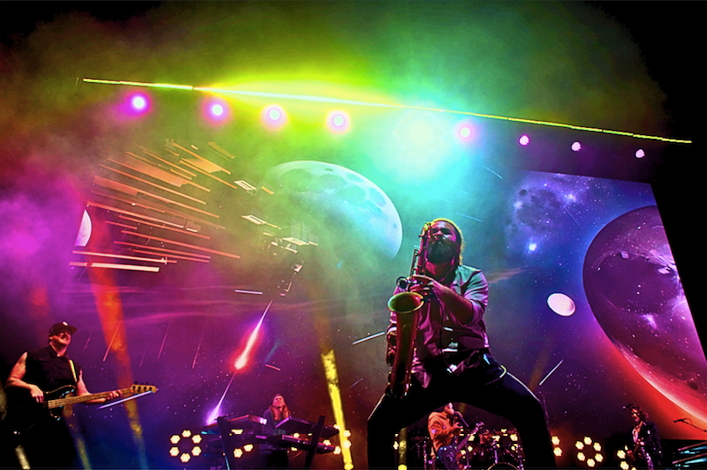Musings on Life, Queerness, and Hip Hop: Cakes Da Killa

Denny Patterson is a St. Louis-based entertainment and lifestyle journalist…
Although indie rap artist and nightlife maven Cakes Da Killa launched into the mainstream after appearing on Netflix’s reality competition Rhythm + Flow in 2019, he already made a name for himself as a leading figure of the queer hip-hop explosion almost a decade earlier.
Giving listeners a witty flow and unapologetic delivery, Cakes helped push the acceptance of openly gay artists in hip-hop, a genre that has been historically low when it comes to LGBTQ representation. Mixing 90s grit with high energy club beats, Cakes’ unique persona quickly cemented him as one of the most dynamic lyricists to hit the airwaves. He continues to break barriers and pave the way to promote Black excellence and LGBTQ visibility in the media.
Cakes has a bright future ahead, and we cannot wait to see what he delivers next. Recently, he reunited with producer Proper Villains for the new Muvaland Vol. 2 EP, the sequel to last year’s Muvaland.
OFM had the pleasure of connecting with Cakes to talk more about the EP, the divide between the LGBTQ community and hip-hop, and living your life to the best of your ability.
Let me begin by asking, did you have a great Pride Month?
Yes! Pride was great, and I am happy that we are moving into a post-pandemic world where we can celebrate again.
You collaborated with Alus for her Pride single, “Wig!” What was that experience like, and why did you want to be involved with that project?
I wanted to be involved with the project because I genuinely liked the song. I had a lot of requests to collaborate with people, and I kind of just go with my gut. So, that was it. I really liked it, and it was a no-brainer. I was in that space to be creative.

As a person of color, I would like to ask your opinion on a hot debate that has been receiving more and more attention. Do you believe law enforcement should be involved with Pride celebrations?
I believe law enforcement should be involved in a capacity where if you have an event and there are people where issues can happen, but I do feel like law enforcement needs to be educated on how to deal with people in the community. That is the bigger issue. Police should just be good at doing their jobs. Are police good at doing their jobs? No, because police are human and have their own racism and homophobia. That is kind of a loaded question. Should good police be working? Yes.
You’re vocal about celebrating Black artists; do you think we are giving them the attention they deserve?
I have always been vocal about celebrating Black artists because I am a Black artist myself, but do I think the mainstream media are more accepting of Black artists? No. I think there is more stealing from Black artists at a higher rate than ever.
You recently released your new EP, Muvaland Vol. 2. Why did you want to do a sequel to Muvaland, and what was the EP’s concept and inspiration?
The initial EP was supposed to be a one-off that I did with Proper Villains. We put it out at the height of the pandemic, and for me, it was just something that I wanted to do for the community as something to take their minds off of what was going on. We really thought the world was going to fucking end. It still may [laughs]. So, I wanted to put out a high-energy project, and Classic Music Company put out the first installment of it.
Muvaland Vol. 2 is a joyride back to 90s ballroom?
It is more so just a throwback to 90s club music. Think about when you would go to the clubs in the 90s. Going to places like The Limelight or The Sound Factory.
How has ballroom culture contributed to your success as an artist?
I came out during a time where being Black and gay, there were no visible characters like there are now. If you wanted to socialize, be creative, or have an outlet to meet people like you, you had to go to the Village and meet people who vogued. That is why the community is so large. For so long, people like us, Black and brown gay, trans, and nonbinary people, we did not have places to go to be creative.
Ballroom has always allowed me to network, and it has always been a place of inspiration. It is a lot bigger than what people make it out to be, especially with it becoming more mainstream. I love that it is having its time on the mainstage because there is a lot of talent in the ballroom community.
With shows like Legendary and Pose, what needs to be done for people to know that ballroom culture is more than just a trend?
I think for people to know that ballroom is more than just a trend, they actually need to talk to people that are actually affluent in the community and take part in the community. Opposed to running with what they hear through the filter. A lot of people are taking their ballroom-isms from people who are not affiliated with ballroom, so that is when the message gets diluted.

There is a song on Muvaland Vol. 2 called “Stoggaf,” which is the homophobic slur spelled backwards. What is your take on the reclamation of this word, and why did you use it to title the track?
I titled that because that is what the song is about. For me, as someone that grew up being called a faggot, I think that I have every right to re-appropriate, throw glitter, chop, and screw the word as much as I can. Do I think everybody in the community identifies as that or likes the word? No, but I don’t think my life and my existence on this Earth is to please straight people or everybody in the community. I come from a community and from a culture where we go out, and we like to fag out. So, this song is for the people who like to do that, and those who don’t like it, skip the track.
Which song on the track is your favorite?
I like everything I do [laughs].
Overall, what do you hope audiences take away from your music?
I hope audiences take away from my music the fact that you are only here once and that you should have fun. Also, I am just a talented songwriter. I have been doing this for over a decade, and I am probably not going to stop.
Did you always want to pursue a career in music?
No, I never really wanted to pursue music. I kind of just stumbled into it, but once you find something that becomes fulfilling and stimulates your creativity, and you start to get paid for it, I guess that is what you are supposed to be doing.
How did you get into the world of rap?
I fell into this genre just by recording videos of myself rapping on YouTube, just to make my friends laugh. Someone asked me if I wanted to be featured on a mixtape that they were putting together, and ever since then, I just got addicted to recording. I fell in love with performing, and I always had a love for nightlife, so they just combined.
Have you faced any challenges being a queer artist in hip-hop?
I don’t really know of any hardships or blessings that were blocked because of me being open about my sexuality, because I don’t worry about it. I kind of operate on the timeline of, what’s for me is for me, and what’s not for me is not for me. I do not want to be in places or spaces where I have to convince someone that I should be there. My sexuality should not matter. I have been very successful as an artist, and I don’t like to focus on the negatives. I like focusing more on the pros of my accomplishments.
Why do you think there has been such a divide between the LGBTQ community and hip-hop?
[Laughs] That is a loaded question that has to do with a lot of different variables. We can talk about Buck Breaking; we can talk about the role religion has on the African American community, we can talk about politics, we can talk about racism—it’s a lot. Isn’t America like the newest country? We have a lot of things to work on, but it’s a lot. To me, I just feel like people should mind their business. I do not think my presence in media or in life should cause homophobia. I don’t give a fuck what you feel like, but when it becomes violent or you try to put that on someone else, that is out of balance. I think everyone should live their lives and focus on themselves.

Do you think we are heading in a direction where we won’t have to advocate for representation and inclusion as much?
No, because even with this whole meshing of people, people not identifying as homosexual but identifying more as queer and destroying binaries, people are still going to have their racisms and -isms. People try to make it seem like we live in Care Bear land now, but there are still issues between queer people and gay people. The same way that there are issues with people who wear masks. People are flawed, and they are always going to find something to be fucking pressed about. That is why I just stick to my cocktail and mind my business.
What more do you hope to accomplish with your platform?
With my platform, I just want people to really realize that you are only on this planet once, and you should really live your life to the best of your ability. Do and achieve whatever you want to do. If it’s for you, it’s for you, baby.
Stay up-to-date with Cakes Da Killa by following him on all social media platforms including Instagram and Twitter, or visit his official website.
Photos Courtesy of William Chu and Ebru Yildiz
What's Your Reaction?
Denny Patterson is a St. Louis-based entertainment and lifestyle journalist who serves as OFM's Celebrity Correspondent. Outside of writing, some of his interests include traveling, binge watching TV shows and movies, reading (books and people!), and spending time with his husband and pets. Denny is also the Senior Lifestyle Writer for South Florida's OutClique Magazine and a contributing writer for Instinct Magazine. Connect with him on Instagram: @dennyp777.










